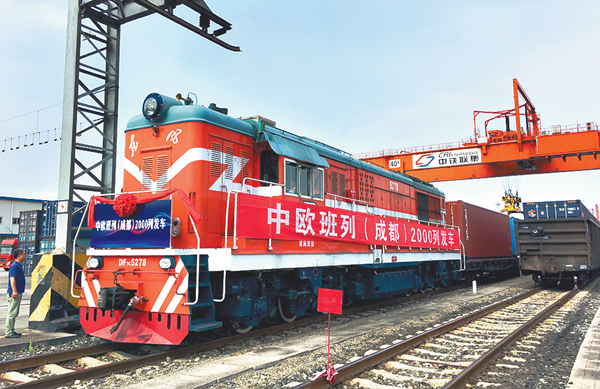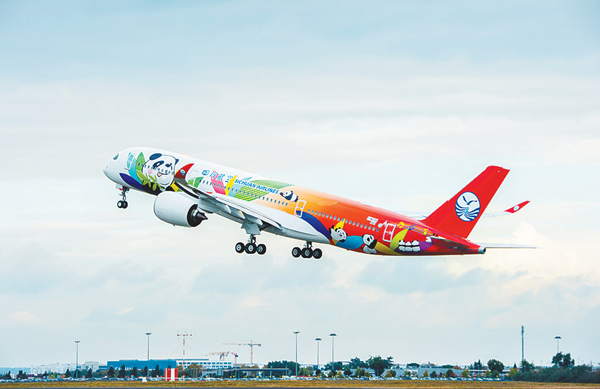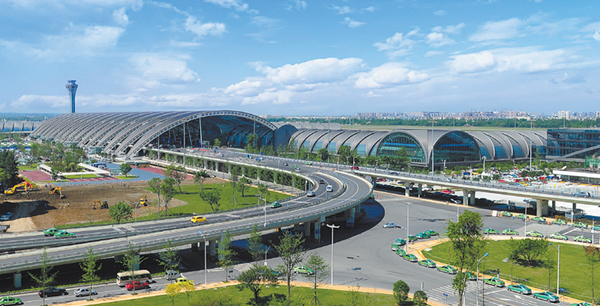Outstanding transport system springboard for growth
2018-08-28 08:57:35
The capital of Sichuan province, Chengdu, is helping to spearhead increased trade with countries involved in the Belt and Road Initiative through its advanced and integrated transport system, further advancing the opening-up of western China, officials said.
On Aug 2, a seemingly routine but nonetheless important China-Europe freight train, loaded with 1,742 metric tons of timber from Russia, arrived at Suifenhe city on the border with Russia. Completing clearance procedures at Suifenhe customs, the train quietly pushed on to Chengdu station.
"Before the China-Europe train route came into operation, timber going to Chengdu mostly came by ship, which would take over 30 days a trip," said Zheng Shuangli, a director of Chengdu International Rail Port Investment and Development Group.
"Now, though, the cargo comes to Chengdu by regular railway container train, saving about half the travel time and cutting the import costs of companies by a lot," Zheng said.
Another special freight train running to Russia from Chengdu began its journey on July 29, transporting cars made by Dongfeng Motor Group worth more than $1.23 million.
The international freight train between Chengdu and Moscow was officially launched in August last year. Goods transported have ranged from computer laptops, shoes, hats and clothes to auto parts.
Returning to Chengdu, its containers are filled with products such as sweets and chocolates, wood and compound floorboards, helping to boost trade between the Sichuan region and Russia.
According to Zheng, since June the freight train between Chengdu and Moscow does six runs a month, three times the previous number. More importantly, the railcars are fully loaded with goods all the time.
Chengdu was included in the rail network initiated by the China-Europe freight train service five years ago. The cross-border network had linked 14 Chinese cities and 16 foreign cities by the end of July.
The Chengdu International Railway Port, part of the China (Sichuan) Pilot Free Trade Zone, is the backbone of the region's plan to establish a global logistics system and booming trade with countries along the route of the Belt and Road Initiative.
In the current year, the port has been expanding connectivity in every direction by building more railway routes.
To date, it has established four major international routes -- north to Russia, west to Europe and Central Asia, south to the countries of the Association of Southeast Asian Nations, and east to South Korea and the Americas.

According to one official, Chengdu is the largest airline hub among the cities of central and western China, providing convenient access to international routes across the globe.
Flights from Chengdu Shuangliu International Airport only take six hours to Tokyo, eight hours to Moscow and 10 hours to Frankfurt. Officials say passengers can arrive in any of the major cities in the world within 15 hours.
On July 3, Air China Limited announced it would launch a regular shuttle flight from Chengdu to London, bringing the number of international routes from Chengdu Shuangliu International Airport to 109. They now link international hubs in Asia, Europe, North America, Africa and Oceania.
Relying on its transport infrastructure that is fully plugged into international flight and railway routes, officials said Chengdu is moving briskly to build itself into the "Silk Road corridor of the air" and an "international sea-to-road combined transportation corridor."
In the wake of Chengdu's increasing connection to the outside world, the gateway city in western China has become an important stopover for foreign leaders visiting China.
At the same time, more and more countries have listed Chengdu above rival cities as their top choice for establishment of a regional consulate in western China.
Chengdu has established trade and economic relations with 228 countries and regions, and attracted offices of 281 Fortune Global 500 companies.

In addition, Chengdu is the first city in western China to have a 72-hour tourist visa-free policy -- after the system was rolled out in Beijing, Shanghai and Guangzhou. This year, Chengdu will also promote a one-window service facility for foreigners working in the city, and push to bring in a 144-hour visa-free policy.
As a hub city under the framework of the Belt and Road Initiative, Chengdu is bidding to seize the development opportunities springing from China's economic reform. These include inland free trade test areas, the national independent innovation demonstration zone as well as the Tianfu New Area, the city's internationalized business precinct.
According to a global metropolis monitoring report issued earlier this year by Washington-based think tank the Brookings Institution Chengdu ranked third among 300 listed global cities because of its outstanding performance in GDP per capita growth and its rising employment growth rate in recent years.
